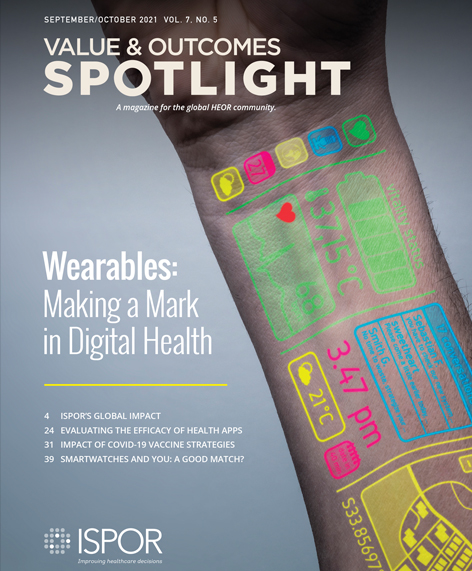New Research Highlights
Section Editor: George Papadopoulos, GradDipEpi, Lucid Health Consulting and University of New South Wales, Sydney, NSW, Australia
Guest Contributor: Aakash Bipin Gandhi, BPharm, ISPOR Student Network Chair, 2019-2020, University of Maryland, Baltimore, MD, USA
Challenges for the Evaluation of Digital Health Solutions—a Call For Innovative Evidence Generation Approaches
Guo C, Ashrafian H, Ghafur S, Fontana G, Gardner C, Prime M. NPJ Digit Med. 2020:3(1):110.
pubmed.ncbi.nlm.nih.gov/32904379/
Summary
Digital health holds great potential for offering favorable healthcare solutions to cater to ever-changing patient needs. Digital health solutions include, but are not limited to, mobile applications, wearable devices such as smart watches and fitness bands, and telehealth services. Digital health has rapidly evolved over the past 2 decades. For example, 200 health applications are added to the market daily with a total of 300,000 health applications currently in existence. In contrast, there is a lack of concurrent growth in the generation of cost-effective and credible evaluation methodologies that can help determine whether digital health products are effective and compliant with set regulatory standards. Traditional approaches for the evaluation of digital health solutions include expert opinion, surveys and interviews, retrospective observational studies, or randomized controlled trials. However, these evaluation techniques are costly and time-consuming. Approaches such as computational or clinical simulation may offer a potential solution. For example, computational simulation can be used for the verification and validation of software components that make up a digital product. Clinical simulation has been previously documented to help develop and evaluate digital health tools. Further, a prior study evaluated standardized responses from primary care physicians who interacted with professional patient actors through video appointments that were based on simulated clinical scenarios. These responses were used to create a clinical decision support tool that can help inform treatment decisions for patients at the time of care.
Relevance
Creators of innovative digital health products may face hurdles regarding the generation of suitable evidence to support their approval and use. Techniques such as simulation methodologies may encourage innovators to pursue development of digital health products due to their low cost and time-saving features as opposed to traditional techniques that incur high costs and are time-consuming.
Advancing Digital Health: FDA Innovation During COVID-19
Kadakia K, Patel B, Shah A. NPJ Digit Med. 2020;3(1):161.
nature.com/articles/s41746-020-00371-7
Summary
During the COVID-19 pandemic, the US Food and Drug Administration (FDA) approved temporary policies to continue supporting the development of digital health solutions through the relaxation of regulatory requirements surrounding these products. For example, the FDA announced that it would not limit the adoption and distribution of digital health solutions that support mental health care such as computerized behavioral therapy or mental health-related mobile health applications for the duration of the state of emergency due to the pandemic. Normally, these digital health solutions would require premarket notification submissions to the FDA under the Federal Food, Drug, and Cosmetic Act, among other regulatory specifications. Further, this would help ensure continued access to suitable digital solutions that help alleviate the adverse effects of mental health conditions that have taken a toll on the population as result of the pandemic. In relation to chronic healthcare conditions, the FDA announced that it would not be opposed to nonsignificant modifications that may result in an alteration to indications, claims, or functionality associated with digital blood pressure measurement instruments or similar noninvasive digital remote monitoring devices. Improved accessibility to these devices can help prevent an increase of in-person clinical visits for associated services and in turn decrease the risk of spreading the COVID-19 infection.
Relevance
This article highlights the need and significance of flexibilities for regulatory requirements associated with digital health products, especially considering the long-lasting impact the pandemic may have on population healthcare systems. The article stresses that specific guidelines related to such efforts should be included in a country’s pandemic preparedness and recovery plan in order to ensure that access to and evolution of innovative technologies such as digital health products is not hindered.
Explore Related HEOR by Topic

